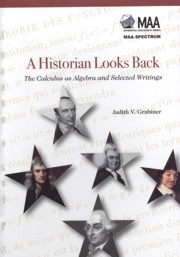Book contents
- Frontmatter
- Contents
- Introduction
- Part I The Calculus as Algebra
- Part II Selected Writings
- 1 The Mathematician, the Historian, and the History of Mathematics
- 2 Who Gave You the Epsilon? Cauchy and the Origins of Rigorous Calculus
- 3 The Changing Concept of Change: The Derivative from Fermat to Weierstrass
- 4 The Centrality of Mathematics in the History of Western Thought
- 5 Descartes and Problem-Solving
- 6 The Calculus as Algebra, the Calculus as Geometry: Lagrange, Maclaurin, and Their Legacy
- 7 Was Newton's Calculus a Dead End? The Continental Influence of Maclaurin's Treatise of Fluxions
- 8 Newton, Maclaurin, and the Authority of Mathematics
- 9 Why Should Historical Truth Matter to Mathematicians? Dispelling Myths while Promoting Maths
- 10 Why Did Lagrange “Prove” the Parallel Postulate?
- Index
- About the Author
9 - Why Should Historical Truth Matter to Mathematicians? Dispelling Myths while Promoting Maths
from Part II - Selected Writings
- Frontmatter
- Contents
- Introduction
- Part I The Calculus as Algebra
- Part II Selected Writings
- 1 The Mathematician, the Historian, and the History of Mathematics
- 2 Who Gave You the Epsilon? Cauchy and the Origins of Rigorous Calculus
- 3 The Changing Concept of Change: The Derivative from Fermat to Weierstrass
- 4 The Centrality of Mathematics in the History of Western Thought
- 5 Descartes and Problem-Solving
- 6 The Calculus as Algebra, the Calculus as Geometry: Lagrange, Maclaurin, and Their Legacy
- 7 Was Newton's Calculus a Dead End? The Continental Influence of Maclaurin's Treatise of Fluxions
- 8 Newton, Maclaurin, and the Authority of Mathematics
- 9 Why Should Historical Truth Matter to Mathematicians? Dispelling Myths while Promoting Maths
- 10 Why Did Lagrange “Prove” the Parallel Postulate?
- Index
- About the Author
Summary
Who is the audience for scholarship in the history of mathematics? Historians of mathematics, perhaps, or maybe some historians of science. But a much larger group is mathematicians and students of mathematics. I talk to mathematicians a lot, and I believe that we are in fact doing something of interest to mathematicians. We have an advantage over historians of other subjects. A distinguished mathematician asked me recently what Euclid had said about a particular result. I doubt that many historians of physics are asked by physicists, “Tell me, how did Aristotle prove that the earth can't move?” Mathematicians use history to enliven the subject, or to motivate topics, or to humanize mathematicians to a general audience, or to justify mathematics to government and public. But is the history right? As historians, we think getting it right matters. Do mathematicians think that?
Now there are a lot of myths out there in the mathematics community. I will walk the reader through seven of the myths I have encountered in my career as a historian of mathematics. I will suggest how to debunk them, and, more important, what is at stake, for the teaching and understanding of mathematics, in getting that particular thing right. At the end, I will bring this together by telling you again how important the historian's work can be.
A.Myth: The social history of mathematics is easy; just determine what nation or group your mathematician comes from and generalize.
Consider how Eric Temple Bell, in his book Men of Mathematics, describes some controversies between the 19th-centurymathematicians Leopold Kronecker and Georg Cantor.
- Type
- Chapter
- Information
- A Historian Looks BackThe Calculus as Algebra and Selected Writings, pp. 243 - 256Publisher: Mathematical Association of AmericaPrint publication year: 2010



